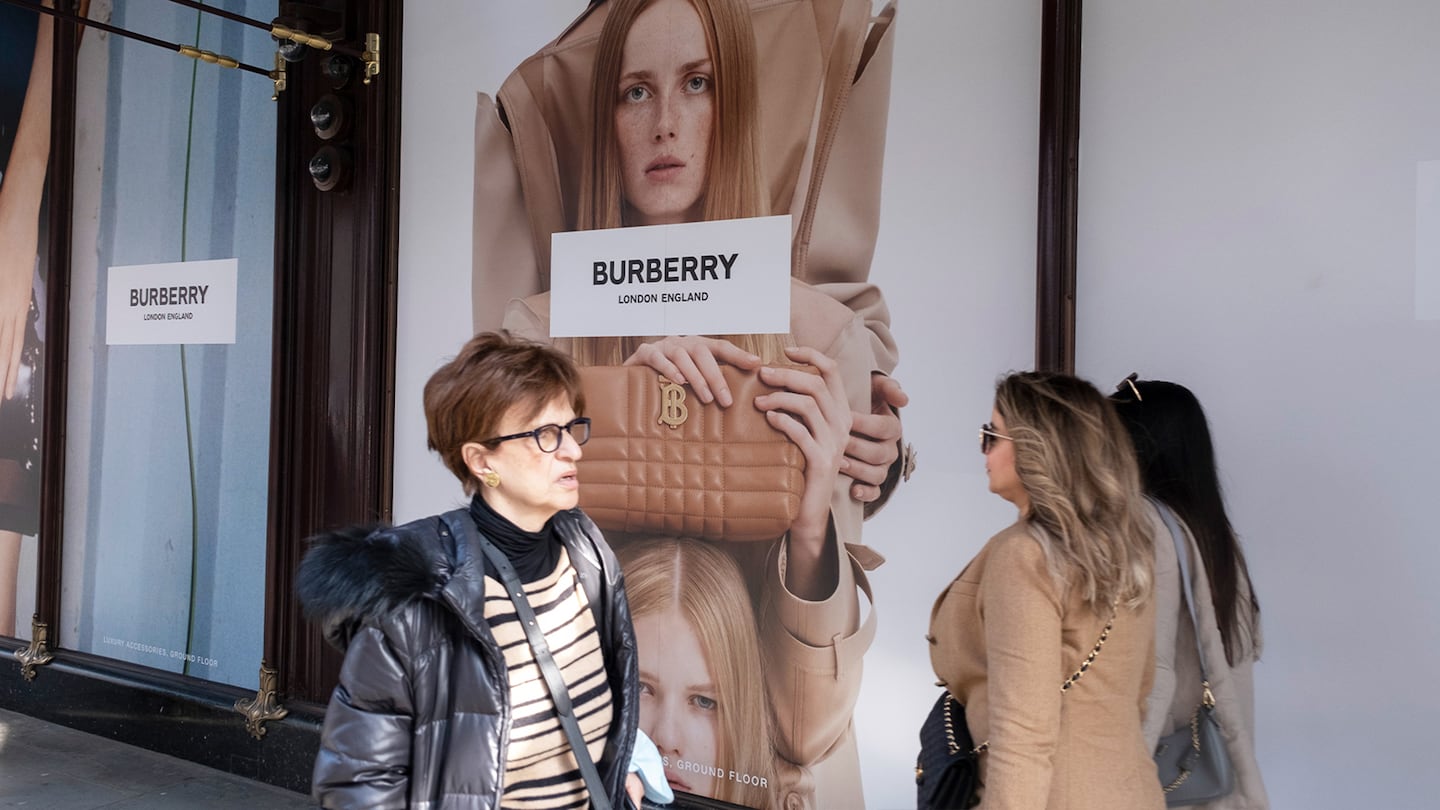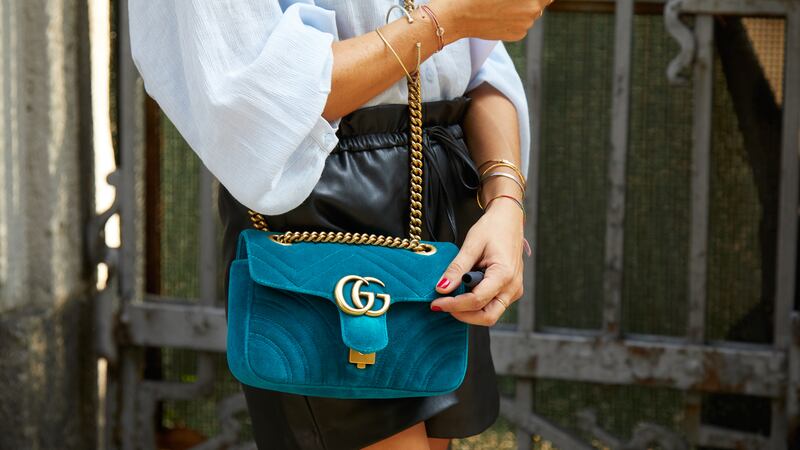
The Business of Fashion
Agenda-setting intelligence, analysis and advice for the global fashion community.

Agenda-setting intelligence, analysis and advice for the global fashion community.

On Monday, Burberry chairman Gerry Murphy rebuked UK prime minister Rishi Sunak, saying his decision to eliminate tax-free shopping for tourists, made in 2020 when he was Chancellor of the Exchequer, had made Britain the “least attractive shopping destination in Europe.”
Tax-free shopping schemes are sometimes seen as a handout to retailers, making them an easy target for cash-strapped governments like the UK, but such programmes have serious economic impact.
Murphy said Burberry sales data showed the UK had delivered “by far the weakest recovery” from the pandemic amongst major fashion markets, citing Brexit’s “drag on growth,” and that the decision to remove tax refunds for international visitors was only making matters worse.
The “somewhat peverse” policy was “actively exporting business” to European shopping hubs like Paris and Milan, where tax-free shopping remains in place, he added.
ADVERTISEMENT
The Burberry chairman said he understood the “fiscal imperatives” that compelled Sunak to make his 2020 decision, but that it was time for the government to reverse course.
Tax refunds have long been a draw for high-spending visitors from China, the Gulf and the US, who see shopping for luxury brands from Burberry to Chanel as an increasingly important element of their trips to Europe.
With the pandemic behind them, they have flocked back to European retail hubs. But tourist spend is recovering at a much faster rate on the continent than in the UK.
Data from tax refund company Global Blue shows that while spending by American visitors to Britain has returned to pre-Covid levels, spending in France and Italy has soared to twice those levels. And the pattern is more pronounced among visitors from the Middle East, who now prefer to shop in France and Italy over the UK at even higher rates than their American counterparts.
Data provided by Burberry shows third-quarter sales to American visitors were up 102 percent on pre-pandemic levels in Europe but up only 63 percent in the UK; meanwhile sales to visitors from the Middle East were up 122 percent in Europe but just 14 percent in the UK.
In London’s West End shopping district, the impact is palpable. While international tourists are returning to the British capital, they are choosing to spend elsewhere. This year, flight bookings from the US to London are up 37 percent over pre-pandemic levels, but American spending in the West End is up only 4 percent. Meanwhile, travel from the Gulf is up 13 percent, but spend is down 1 percent.
Now, the issue is coming to a head. As wealthy tourists make their plans for what is expected to be an exceptionally busy summer travel season, spurred by the YOLO (“you only live once”) spirit that has taken hold since the pandemic and the end to Covid-era travel restrictions in China, the world’s largest luxury market, the issue is set to worsen, with serious implications not only for retailers, but restaurants, museums, theatres, taxis and others that depend on tourist spending.
In a recent Global Blue survey of 10,000 Chinese who had visited Europe in 2019, Britain had fallen from second most-popular destination to fifth, behind not only France, but Spain, Italy and Germany.
ADVERTISEMENT
There are signs that luxury brands may be reprioritising investments. Earlier this year, British label Mulberry said the end to tax-free shopping was a major factor in its move to close its Bond Street store.
Last autumn, the UK government considered restoring tax-free shopping, estimating this would cost £1.3 billion in 2024-2025, increasing to £2.0 billion in 2025-2026. But these figures reflected only the cost of projected refunds and not the value of incentivising people to visit and shop in the UK in the first place.
A November 2022 study by Oxford Economics found that the government’s forecasts overstate the costs of tax-free shopping refunds while failing to take into account the value of reinstating the scheme: 1.6 million more visitors to the UK in 2025-2026, delivering £2.8 billion in additional tourist spending.
Reviving tax-free shopping would cost 70 percent less than government projections, while the net boost to the UK’s GDP would be significantly higher than incentivising British consumer spending, the study concluded.
Is it time to bring back the UK’s tax-free shopping scheme?
Burberry chairman Gerry Murphy certainly thinks so, and the data appears to be on his side.
THE NEWS IN BRIEF
FASHION, BUSINESS AND THE ECONOMY
ADVERTISEMENT

Kering sales edge up one percent, lagging rivals. Sales at French luxury group Kering rose by just one percent in the first quarter, as star label Gucci benefitted less than rivals from a rebound in China, and revenues fell sharply in the US.
LVMH’s market value exceeds $500 billion, a first in Europe. LVMH’s market value surpassed $500 billion, becoming the first European company to reach that milestone thanks to booming sales of luxury goods in China and a strengthening euro.
Valentino reports a 10 percent rise in annual sales. Having rebounded from the worst of the pandemic in 2021, the Italian couture house continued its growth last year, with sales rising to €1.42 billion ($1.58 billion) for the 12 months through Dec. 31, a 10 percent increase in constant exchange rates.
Puma expects second-quarter sales growth below full-year target. German sportswear maker Puma on Wednesday said it expected second-quarter sales to grow at a low- to mid-single-digit percentage rate, below its full-year target, due to high inventory levels and ongoing challenges in the market.
Gap to eliminate about 1,800 positions. Gap Inc said on Thursday it would cut about 1,800 jobs in a second round of layoffs, joining a set of big US companies that are downsizing in earnest as high inflation eats into consumer wallets.
Fast Retailing’s Uniqlo to add stores in North America. Uniqlo plans to expand its existing stores in North America by 10 percent, according to one of its executives.
Hermès settles Skechers patent lawsuit over shoe soles in New York. French luxury fashion house Hermès International SCA has settled a lawsuit brought by Skechers USA Inc that claimed Hermès sneakers infringed Skechers’ patent rights, according to a filing in Manhattan federal court.
SMCP’s bondholders expect initial bids for their stake by mid-May. Bondholders in French fashion group SMCP, the owner of labels such as Sandro and Maje, are expecting first-round, non-binding bids for their 37 percent stake in the company by mid-May.
Spain’s Tendam hands Russian shops to Belarusian company. Spanish fashion group Tendam will reopen its stores in Russia through a Belarusian company, its chief executive officer told Reuters on Tuesday, following the model of Mango, which transferred its stores to Russian franchisees last year.
Shein tops up supply chain fund with $55 million and a focus on faster, more efficient manufacturing. The ultra-fast-fashion giant plans to spend $70 million over the next five years to train and support suppliers and develop leaner production models.
Primark under pressure from inflation and weak pound sterling. Primark’s margin shrank to 8.3 percent in the first half from nearly 12 percent a year earlier, owner Associated British Foods Plc is struggling with the impact of inflation, with an elevated wage bill and high commodity costs.
THE BUSINESS OF BEAUTY

Talc supplier to J&J, Avon, Estée Lauder files for bankruptcy after lawsuits. A talc supplier filed for bankruptcy after a South Carolina jury ordered it to pay more than $29 million to a woman who said tainted talc in cosmetic products caused her cancer.
Germany’s Symrise first quarter sales rise as demand stays strong. German flavour and fragrance maker Symrise on Wednesday posted a jump in first-quarter sales broadly in line with forecasts, citing robust demand across the board as it continued to offset inflation with increased prices.
PEOPLE

Ferragamo chief executive officer Marco Gobbetti’s pay was backed by shareholders despite criticism. Salvatore Ferragamo shareholders gave the green light to its proposed remuneration policy, which gives the luxury goods group’s CEO a bumper pay package, despite a recommendations to vote against it.
MEDIA AND TECHNOLOGY

Start-up e-commerce platform Temu expands to Europe. Ultra-low-cost e-commerce platform Temu, owned by PDD Holdings, has started selling to European markets, including France, Germany, Italy, The Netherlands, Spain and the United Kingdom.
Compiled by Sarah Elson.
The Hood By Air co-founder’s ready-to-wear capsule for the Paris-based perfume and fashion house will be timed to coincide with the Met Gala in New York.
Revenues fell on a reported basis, confirming sector-wide fears that luxury demand would continue to slow.
IWC’s chief executive says it will keep leaning into its environmental message. But the watchmaker has scrapped a flagship sustainability report, and sustainability was less of a focus overall at this year’s Watches and Wonders Geneva.
The larger-than-life Italian designer, who built a fashion empire based on his own image, died in Florence last Friday.